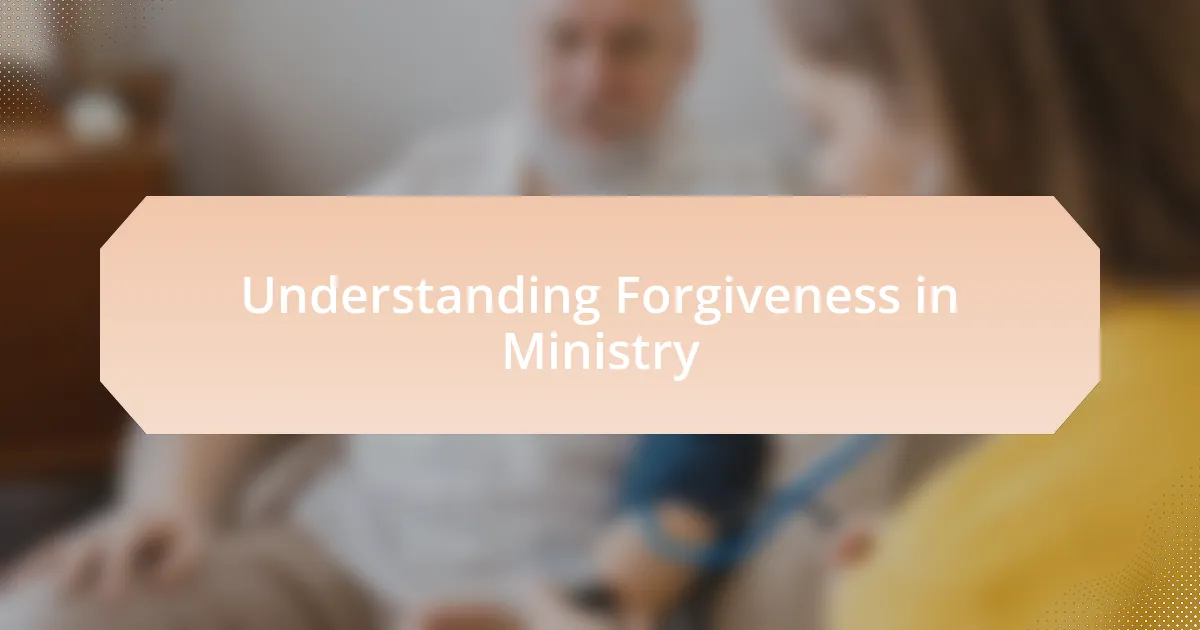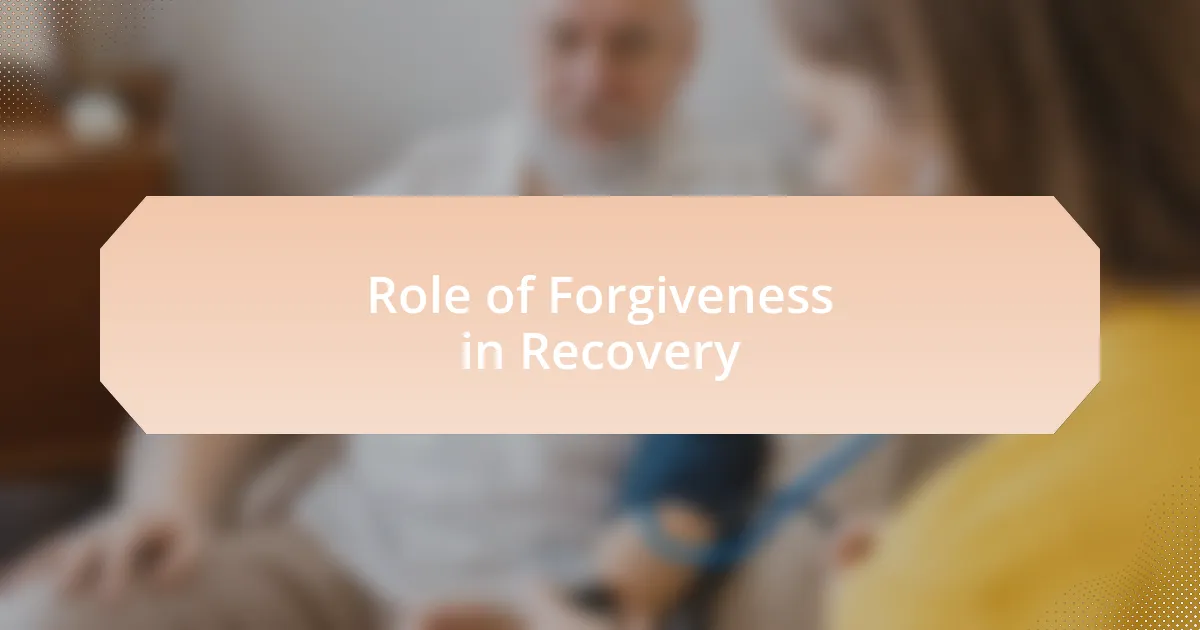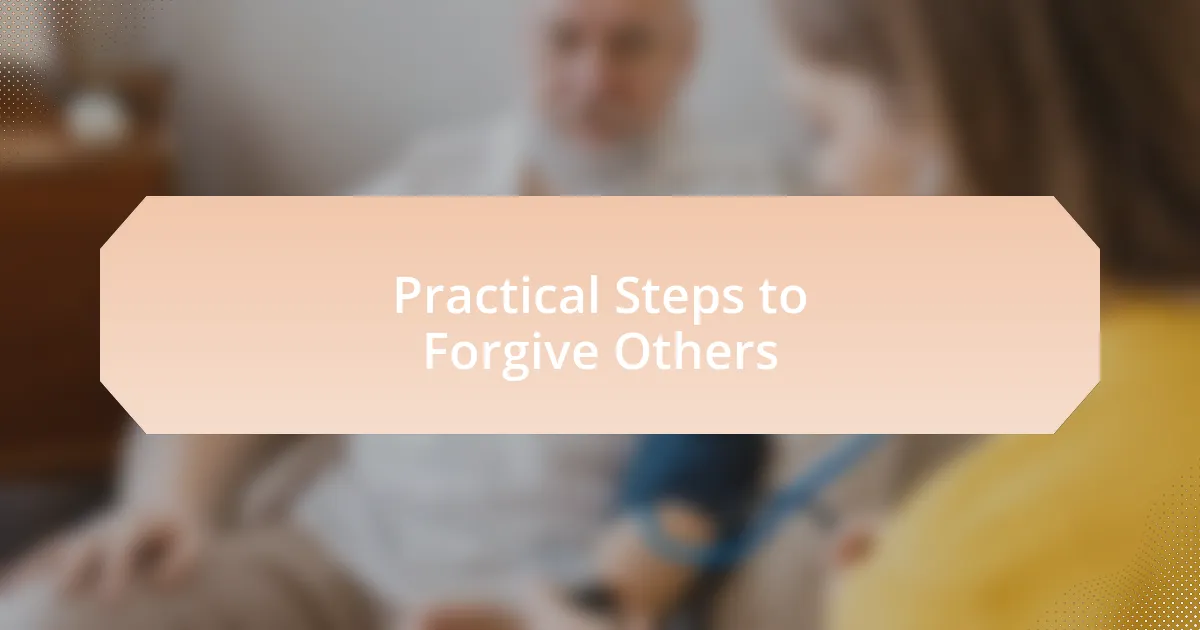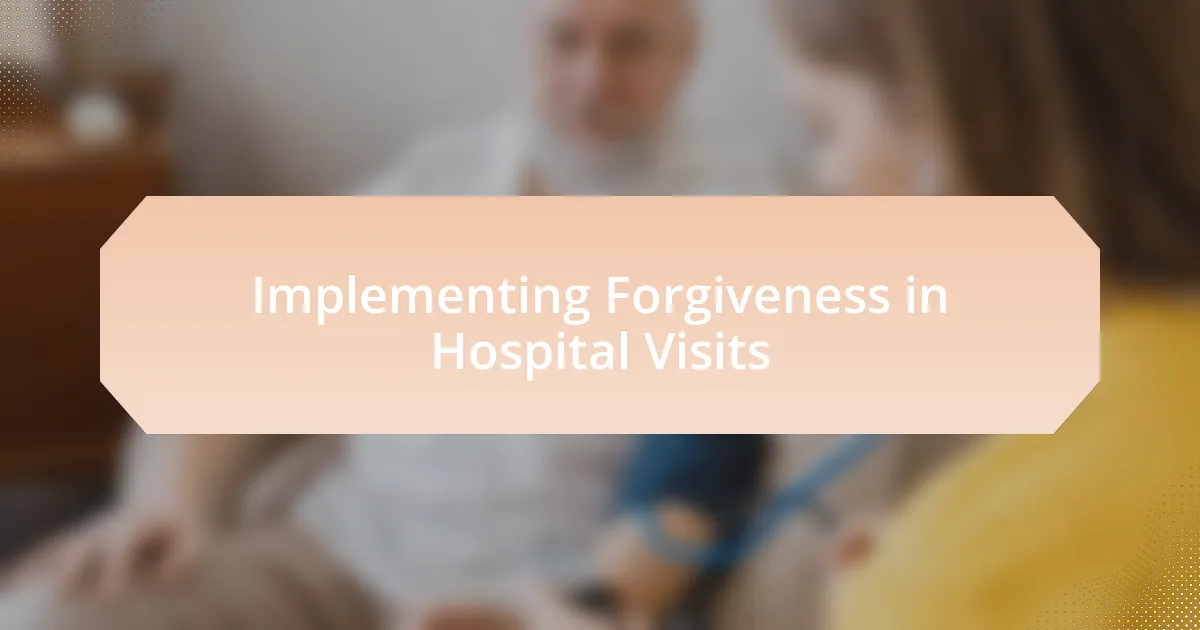Key takeaways:
- Forgiveness in ministry can transform relationships and promote healing by sharing vulnerabilities and letting go of bitterness.
- It facilitates emotional and spiritual recovery, allowing individuals to move past trauma and resentment, leading to renewed strength and connection.
- Practical steps to forgiveness include understanding the hurt, expressing feelings openly, and setting intentions to forgive.
- In hospital visits, adopting a forgiving mindset and offering sincere apologies can deepen connections and foster healing.

Understanding Forgiveness in Ministry
Forgiveness in ministry is often a complex journey, not just for those who seek it but also for those who extend it. I remember a time when a fellow minister and I had a deep disagreement that threatened our working relationship. Instead of letting resentment fester, we decided to sit down and talk it through, which made us both realize how our wounds, while different, were similar in their impact. Isn’t it fascinating how sharing our vulnerabilities can often break down barriers?
In my experience, the act of forgiveness can be a profound healing tool within a ministry setting. I’ve witnessed congregants who have harbored long-standing grudges slowly transform when they choose to forgive, letting go of bitterness that had held them captive for years. How empowering it is to see individuals reclaim their joy and purpose once they decide to move past their hurt!
Understanding forgiveness in the context of ministry also requires acknowledging that it’s not always easy. There can be feelings of anger that bubble up and the temptation to dwell on past grievances. When I feel overwhelmed by these emotions, I take a moment to reflect on the grace we receive daily. Hasn’t every one of us stumbled at some point? Recognizing our shared humanity can pave the way for deeper connections built on compassion and understanding.

Role of Forgiveness in Recovery
Forgiveness plays a pivotal role in recovery, particularly when it comes to emotional and spiritual healing. I’ve seen individuals who’ve faced deep personal trauma start to rebuild their lives once they make the conscious choice to forgive. It’s almost as if forgiveness acts like a key, unlocking the chains of past pain and allowing for new beginnings—can you imagine how liberating that feels?
When someone chooses to forgive, they are often surprised by how much lighter they feel. I recall a congregant who had suffered the loss of a loved one through betrayal; initially, they were consumed by anger. But as they leaned into the process of understanding and forgiving, I watched them gradually regain not just their strength, but a renewed sense of life itself. Isn’t it inspiring to see how the burden of resentment can dissolve into something beautiful?
Moreover, forgiveness doesn’t always mean forgetting; rather, it can facilitate healthier relationships moving forward. I learned through my journey that harboring grudges often affects my emotional well-being more than the person I hold them against. This realization prompted me to let go of past grievances, fostering a more peaceful mindset. How powerful it is to acknowledge that forgiveness serves as a pathway to recovery, allowing us to develop deeper, more genuine connections with others!

Practical Steps to Forgive Others
When I think about how to forgive others, I find that the first step often revolves around understanding the hurt caused. For example, I once had to process feelings of betrayal from a close friend. By taking time to reflect on their perspective and acknowledging my pain, I began to humanize their actions, allowing space for forgiveness to grow.
Another practical approach I’ve found helpful is expressing my feelings openly, whether through journaling or talking to someone I trust. I vividly recall sharing my struggles during a small group session at church, and the relief I felt was profound. It became evident to me that voicing my pain not only lightened my emotional load but also opened up avenues for genuine support from others—what if that’s the boost we all need towards forgiveness?
Finally, I believe that setting a personal intention to forgive is essential. Some days, I remind myself to visualize releasing the anger I hold onto. I remember an instance when I practiced this actively, imagining my frustration dissipating like a fog lifting, revealing clarity beneath. This practice not only shifted my focus from resentment to healing but also empowered me to reclaim my peace. Wouldn’t it be wonderful if, by simply choosing to forgive, we could transform our lives for the better?

Implementing Forgiveness in Hospital Visits
When visiting someone in the hospital, I find that approaching the moment with a mindset of forgiveness can be transformative. I recall a visit to a friend who had been through a tough time, and I realized that letting go of past grievances made our connection deeper. Have you ever noticed how forgiveness can shift the atmosphere in a room? In that instance, it allowed us to focus on healing rather than lingering resentments.
Another practice I embrace during hospital visits is offering sincere apologies, even if the person isn’t ready to hear them. There was a time when I quietly expressed regret for not being there for a loved one during their illness. Their tearful acknowledgment reminded me just how powerful an honest admission can be in fostering healing. Isn’t it remarkable how even a small act of humility can spark a greater willingness to move forward together?
Additionally, I believe that actively listening and validating the feelings of both the patient and their family fosters an environment conducive to forgiveness. I remember sitting with a couple who were struggling with a past misunderstanding during their loved one’s hospitalization. By encouraging them to share their emotions, I could sense their burdens lifting, and it became evident that, sometimes, the act of listening is just as healing as providing solutions. How does that resonate with your experiences in similar situations?